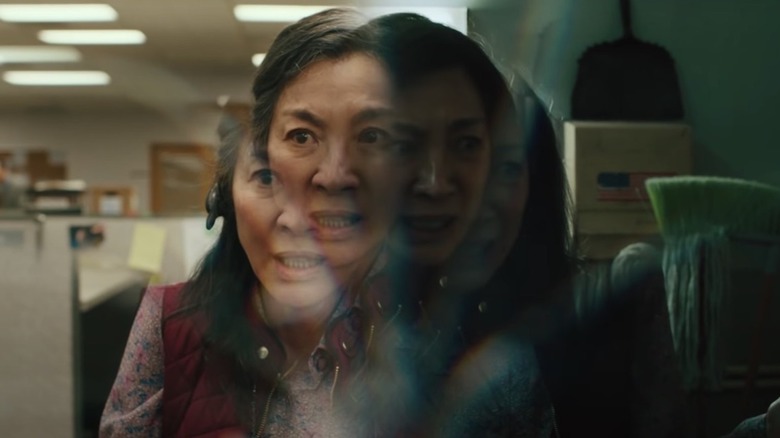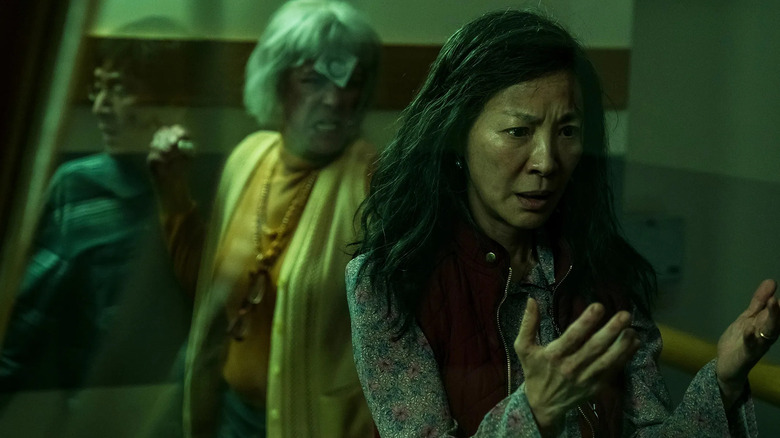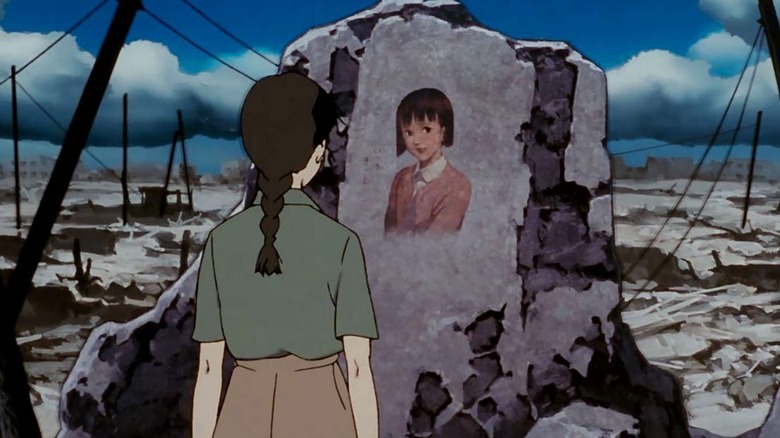Everything Everywhere All At Once Is Anime
It is still early in the year, but there is little doubt that "Everything Everywhere All at Once" is one of the best movies of 2022. It's a film about coming to terms with the choices you've made, about knowing that the world is on fire, staring at the dark abyss of despair, and choosing kindness and love instead.
In addition to astounding, kinetic action and a rapid-fire pace that never slows down, the film also features surreal and bizarre imagery that unequivocally and uniquely belongs to filmmakers Daniel Kwan and Daniel Scheinert — collectively known as Daniels. It is also this brand of weirdness and disregard for the laws of the physical plane that exudes big anime vibes, and is in no small part why "Everything Everywhere All at Once" rules.
The Daniels have always had this idiosyncratic and surreal visual style. Their music video work tracks a genre-defying career with videos that defy all logic but still are easy to follow and highly entertaining. In other words, the Daniels were born to make anime (or at least anime-like projects). Really, watch their game-changing video for "Turn Down For What" and tell me this bizarre world where people just go mad and start dancing and humping everything on-site doesn't feel right at home with the aforementioned hot-dogs-for-fingers-universe from "Everything Everywhere All at Once."
When physics and logic don't matter
The film follows Evelyn (Michelle Yeoh), a woman with no skills, no aspirations, and a parade of abandoned goals and dreams, who has to channel the abilities of her alternate selves to save the multiverse from annihilation
Though the multiverse has been a staple of science fiction for decades and has dominated our pop culture landscape for a little while now thanks to the superhero genre, "Everything Everywhere All at Once" does things differently. More than just using the multiverse to tell a big scale action story with multiple versions of the same character fighting together, the film takes a more intimate approach. It is cool to see Evelyn channeling the martial arts skills of her alternate self who is a wuxia star, sure. What makes that scene powerful, however, is seeing our Evelyn react to the small yet significant choice that would have led her down that path and how that fills herself with regret.
This brings to mind Isao Takahata's masterpiece "Only Yesterday" from Studio Ghibli, about a 27-year-old woman who travels to her family home and is plagued by memories of herself as a young kid and has to come to terms with the choices she's made in life — and whether her younger self would be happy with how life turned out. Likewise, Mamoru Hosoda's "The Girl Who Leapt Through Time" uses the sci-fi concept of time travel to tell an intimate coming-of-age film.
Still, "Everything Everywhere All at Once" is also a pretty bonkers sci-fi action film. From a universe where everyone has huge hot dogs for fingers (an idea Michelle Yeoh was originally against) to an extended sequence where two literal rocks have a heart-to-heart conversation to a running gag about "Ratatouille," the Daniels exploit the medium of film and its endless possibilities like the best anime films do. In many ways, this is the live-action equivalent of Masaaki Yuasa, an anime filmmaker with a distaste for rigid, solid visuals. Just look at "The Tatami Galaxy" and its wild character designs and experimental animation that feels like a madman's imagination just spilled into the frame. Whether it's a sweet and heartfelt romance with a blob of water or the most NSFW anime Netflix has ever produced (that nevertheless has a lot to say about humanity and empathy), Yuasa knows how to balance surreal imagery with emotional stories, and the Daniels carry on that spirit in this film.
Keeping the spirit of Satoshi Kon alive
Through "Everything Everywhere All at Once," we see many alternate versions of Evelyn, from an opera singer to a piñata. One of the main ones is a version of Evelyn that broke up with her husband Waymond, spent years training in martial arts, and became a huge action star. Using real footage from Yeoh's "Crazy Rich Asians" press tour, the film uses this alternate version of Evelyn, who lives a life close to the career of the actress who plays her, to add a layer of verisimilitude and bizarre realism to the character. The more alternate versions we see, the more prismatic Evelyn becomes. The visuals of the film follow suit, moving quickly through the different universes as we explore everything, all at once.
This approach, which treats the multiverse as one single thing that changes depending on the viewing angle, brings to mind the late great Satoshi Kon's approach to reality. Whether it's "Millennium Actress" and how it portrays the different chapters in the life of an acclaimed actress, or how "Paprika" plays with what is fantasy and what is real, Kon had a knack for quickly showing multiple aspects of the same thing in a surreal yet familiar way.
Indeed, though we have seen many Satoshi Kon imitators, perhaps the biggest compliment one can give "Everything Everywhere All at Once" is that it is the closest live-action has come to capturing the fast-paced editing and surreality of Kon's movies. In his review of the film, /Film's Jacob Hall wrote that:
"The Daniels stack visual tricks on top of each other, wrap dense exposition into action, and trust you to keep up with a pace that feels like it can't stop, won't stop, and doesn't apologize. It would be exhausting if the film didn't feel like it's refreshing itself every 15 minutes."
This is the same approach that allowed Kon to make an anime series about anxiety and escapism that could jump from comedy to horror, to fantasy then drama, all in the span of 20 minutes. His work always spoke of the culture around us, of the terrors and anxieties we face every day while wrapping those stories in fantastical worlds where anything is possible. Though Kon was sadly taken from us too soon, the spirit of his work lives in "Everything Everywhere All at Once."


